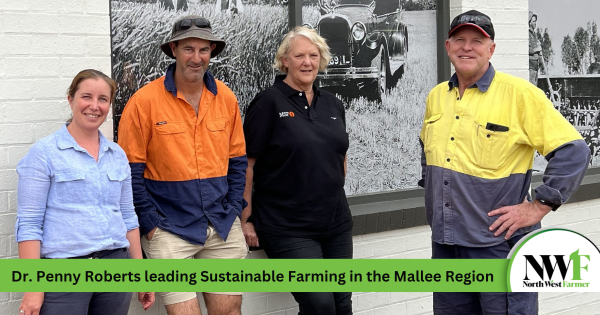Mallee Sustainable Farming’s new research manager, Dr Penny Roberts, says she embraces innovative research that can help growers evolve. ANDREW MOLE reports.
AGRICULTURAL research scientist Dr Penny Roberts is always happy to let her work do the talking for her.
The latest recruit to Mallee Sustainable Farming as its research manager, she has a diverse track record with some outstanding achievements along the way.
Yet Dr Roberts works almost as hard at dodging the limelight as she does fronting fantastic research projects.
For her, a win-win is a job completed and the knowledge her work has contributed to the good of the farming community and has advanced knowledge through diversified crops and introducing new practices to benefit farmers and their communities.
MSF chair Steve Burt says he believes Dr Roberts’ “insights and innovative approach will significantly contribute to our efforts in advancing sustainable farming practices in the Mallee region”.
Mr Burt says her appointment to this new position with MSF has been made “in anticipation of her fresh perspectives and innovative ideas, which will further drive sustainability and progress in the farming practices of the Mallee”.
The organisation’s managing director Jenny Garonne agrees, and says Dr Roberts’ portfolio complements the expertise already provided by the three existing research practitioners engaged within MSF.
She says “with Penny joining the team, MSF will extend its capacity to offer professional research and extension to support the dryland farmers in the low rainfall areas to be more sustainable for the future”.
Covering Mallee country in SA, Victoria and NSW, Dr Roberts says her office is more likely to be a trial or demonstration site, individual farms, with researchers or, increasingly, in a paddock near you.
Previously based in the picturesque Clare Valley, north of Adelaide, where for years she was a researcher with her finger on the pulse of, well, of pulses (the edible seed from a legume plant), Dr Roberts is now the proud owner of an incredibly diverse portfolio with a major focus on change.
And change, she says, can be anything because every change will have a ripple effect right through a farming enterprise.
“I see my role as very much supporting growers achieve practice change by embracing innovative research,” Dr Roberts explains.
“And we will help them do that by staging on-farm demonstrations and trial sites and then putting quantifiable outcomes in front of the farmers.”
“Farm systems change, and they always need to. It might be something with the soil, or machinery and, almost certainly, technology, and the MSF team I am now part of will deal with all the above – and more.
“The results from all these projects will also be passed onto growers at field days and/or extension events.”
She adds what MSF really values at that point is data and feedback from member growers, and others, “so we can assess we are going in the right direction with the work we are delivering”.
The other achievement the low-profile Dr Roberts neglected to mention was her receipt of a Churchill Fellowship (which was almost a fact finding mission of the globe as it saw her making 15 flights zigzagging her way around the world) as part of her broad agricultural science experience, which she has applied in environments across western and southern Australia.
For example, her doctorate (completed in 2011) explored opportunities for novel crop-pasture systems for mixed farms in the higher rainfall zone of southern Australia. She joined SARDI as a research scientist in 2017 and was also an affiliate associate lecturer at The University of Adelaide.
While based at SARDI’s Clare research centre, she led a team of nine staff, supervised a PhD student, and mentored junior researchers.
Throughout her career, Dr Roberts has embraced opportunities to share knowledge with others, particularly the next generation of scientists with similar interests in using their research skills to contribute to positive social outcomes.
Additionally, Dr Roberts regularly received requests to share her pulse crop research results and also works closely with several organisations and partners to deliver high quality actionable research outcomes to industry.
“MSF is currently working with partners including the Grain Research Development Corporation (GRDC), South Australia Grain Industry Trust (SAGIT), the Drought Hubs and the Agriculture Departments in each state and the Federal Department of Agriculture Fisheries and Forestry’s Future Drought Fund through undertaking a wide range of research, development and extension projects.
“Specifically, projects focus on realising the productive potential of Mallee farming systems through improving seeding systems performance, soils and crop agronomy and crop protection”.
“Let’s take a look at soil. This is such a multi-faceted part of the farm, so much of the industry is, so the system can never be just the one thing, change has a flow on effect,” she says.
“Which is why, at MSF, we are lucky to be successfully working with our funding partners and partnering with a range of institutions to deliver relevant research and extension to our grower members.
“That is why it is so important for us to have independent, public good research investigating everything, from the environment to technology.”
Research, Dr Roberts explains, is an interesting approach to solving a problem.
Because often it depends not on the answers but the question which is asked.
“If you don’t frame the question, or the project, correctly, you can’t expect to get the answers for which you were hoping – which is also why MSF and similar groups are so essential for their members,” she says.
“They get the grassroots challenges; they know they must evolve and adapt and by working together we can make sure they are getting the answers they need.”
















